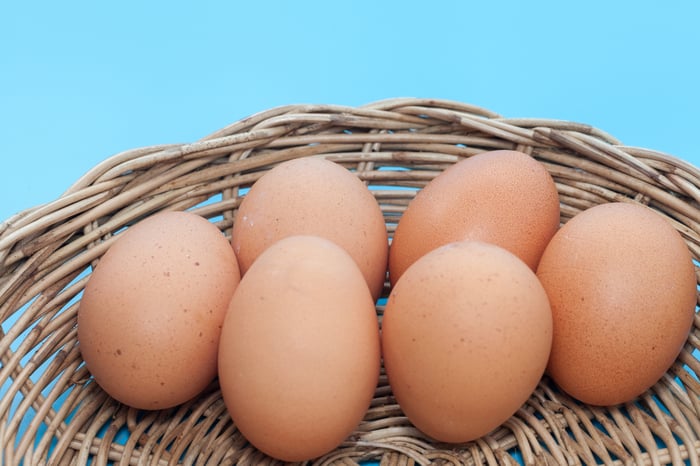By just about any traditional metric, the U.S. stock market is very frothy. As long as investors are willing to pay up big for stocks, so-called growth stocks could keep rising. However, when the momentum music stops, you probably don't want to be holding all growth stocks with nosebleed valuations. Even if you favor growth stocks, adding some value stocks could help balance your portfolio.
One value stock worth at least putting on your watch list is that of consumer staple company Cal-Maine Foods (CALM -1.44%), the largest producer and distributor of fresh shell eggs in the U.S.

Image source: Getty Images.
A losing stock since 2016, but a huge long-term winner
Let's kick things off with a long-term stock chart. Such a chart is more telling than merely listing stock returns for given time periods.
Data by YCharts.
Cal-Maine's business
Cal-Maine Foods produces and sells conventional and specialty fresh shell eggs under the Egg-Land's Best, Land O' Lakes, Farmhouse Eggs, and 4-Grain brands, and under private labels. Its specialty products include cage-free, organic, and nutritionally enhanced eggs. The Missouri-based company sells to grocery store chains, club stores, and food-service distributors primarily in the southwestern, southeastern, midwestern, and mid-Atlantic regions of the U.S.
Cal-Maine's specialty eggs business is powering its growth. Sales volumes for specialty eggs are growing faster than those for conventional eggs, and revenue is growing even faster since specialty eggs are higher priced.
Sales of specialty eggs should continue to grow briskly for some time. In recent years, many major corporate egg buyers in the country have pledged to buy only cage-free eggs by a certain date. These include Walmart and other major supermarket chains. In addition, "a growing number of states have passed legislation requiring cage-free eggs by specified future dates," Cal-Maine CEO Dolph Baker said in the company's fiscal second-quarter 2021 earnings release on Tuesday.
The company, which has about a 19% share of the U.S. shell egg market, can also continue to grow through acquisitions. Since 1989, it has acquired 22 companies ranging in size from 160,000 egg layers to 7.5 million egg layers. Nonetheless, the industry is still quite fragmented. Quoting a 2020 survey by Egg Industry magazine, Cal-Maine says on its website that the 10 largest shell egg producers in the U.S. own about 54% of total industry egg layers.
In its fiscal second quarter, for the period ended Nov. 28, Cal-Maine's revenue jumped 11.5% year over year to $347.3 million. Growth was driven by a rise in shell egg prices and an increase in sales volumes to the retail channel, which was due to consumers eating more meals at home during the COVID-19 pandemic. However, demand from food-service customers "remains well below pre-pandemic levels, due in part to various restrictions on restaurants in place for different areas of the country," Baker said in the release.
For the quarter, the company reported net income of $12.2 million, or $0.25 per share, up from a net loss of $10.1 million, or $0.21 per share, for the year-ago period. This result crushed the Wall Street consensus estimate of a loss of $0.08 per share.
Cal-Maine stock's key stats
|
Company |
Market Cap |
Price/Earnings (TTM) |
Wall Street's Projected 5-Year Annualized EPS Growth |
1-Year, 10-Year, and 20-Year Total Returns |
|---|---|---|---|---|
|
Cal-Maine Foods |
$1.9 billion |
27.8 |
62% |
0% / 216% / 3,830% |
|
S&P 500 |
-- | -- | -- | 19.8% / 270% / 338% |
Data source: Finviz.com and YCharts. Data as of Jan. 8, 2021. TTM = trailing 12 month. EPS = earnings per share.
Cal-Maine stock is priced at 27.8 times its trailing 12-month earnings. That's an attractive valuation given that Wall Street analysts expect the company to grow earnings per share at an average annual rate of 62% over the next five years. Of course, there's no guarantee it will achieve this growth rate. That said, it has a good recent track record of surpassing the Street's bottom-line expectations.
As to Cal-Maine's financials, it has a solid balance sheet. It ended last quarter with cash and short-term investments of $179.1 million and it has no long-term debt.
Variable dividend policy
Due to the unpredictability of the price of shell eggs, Cal-Maine pays a variable dividend. In each quarter that it reports a net income, it pays a dividend of one-third of the quarterly income with the following caveat: Following a quarter for which it does not report net income, it will not pay a dividend until it's profitable on a cumulative basis computed from the date of the last quarter for which a dividend was paid.
Data by YCharts.
This dividend policy means the stock isn't a fit for investors who want a dependable income stream. However, the stock could be a good choice for investors whose main goal is total capital appreciation. The company's dividend has been quite juicy at times. As recently as 2016, the dividend yield was more than 6%, and in 2009 it peaked at over 10%. Moreover, the reinvested dividend makes up a whopping 30% of the stock's total return over the last 20 years.
Consumers love eggs
Investors shouldn't need to concern themselves about demand declining for eggs. The vast majority of consumers eat eggs and that's not going to change, in my opinion. Sure, plant-based foods are gaining steam and people are eating less meat. But vegans, or those who don't eat any animal products, are still quite rare (an estimated 2% to 3% of the U.S. population) and that seems unlikely to change much over the long term.







